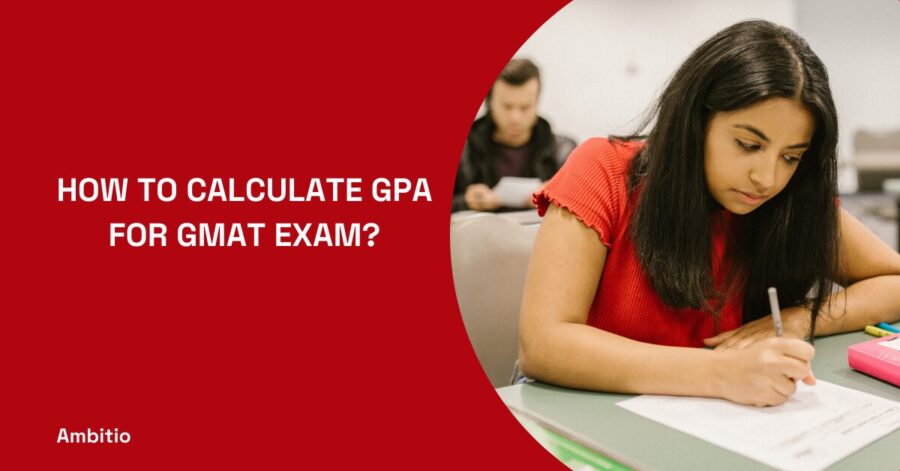4 September 2024
8 minutes read
How To Create A Successful GMAT Study Plan In 2024?

Key Takeaways
- Get a baseline score to identify strengths and weaknesses for a focused study plan.
- Research target scores for your desired MBA programs to keep your preparation on track.
- Mix official practice materials, prep books, and tutoring to tackle all sections of the GMAT.
- Continuously monitor your progress and tweak your study strategies for maximum improvement.
Did you know that only 25% of test-takers achieve a score above 700 on the GMAT? If you’re aiming for a top MBA universities in US or any other country, a high GMAT score is crucial, but getting there is often easier said than done. Many students struggle with balancing their GMAT study plan alongside work, family, and other responsibilities. The pressure to perform well on the GMAT test, especially in sections like quant and tough GMAT verbal questions, can be overwhelming. Without a structured study plan, it’s easy to feel lost and frustrated in your GMAT preparation journey.
The good news is that with a personalized and strategic GMAT study plan, you can effectively prepare for the GMAT and boost your chances of achieving your target score. This guide will help you create a successful study plan tailored to your unique needs and schedule.
Whether you’re just starting your GMAT prep or looking to improve your score, these insights and tips will assist you in navigating the complexities of GMAT preparation. From tackling hard questions and practice questions to developing GMAT time management strategies for test day, we’ve got you covered. Join the GMAT club of successful test-takers and make your GMAT preparation journey smoother and more effective.
What Is A Good GMAT Score?
Typically, a good GMAT score is one that aligns with the admission requirements of your target MBA programs. Most top business schools look for minimum GMAT score of 700, placing you in the competitive percentile. However, the definition of a good GMAT score can vary based on the program and school you’re applying to, as well as your overall application.

In the context of your GMAT exam prep plan, it’s essential to set a realistic target score. Start your GMAT test prep by researching the average GMAT scores of admitted students at your desired business schools. This will help you personalize your study plan to achieve the maximum GMAT score possible for your goals. Utilize official GMAT prep resources and take practice questions to gauge where you stand. Remember, balancing quant and verbal sections, along with improving your critical reasoning and time management skills, is key to reaching your target score.
How To Prepare A Personalized GMAT Study Plan
A tailored study plan allows you to focus on your strengths and weaknesses, ensuring that you make the most efficient use of your time to study. Whether you’re balancing work, family, or other commitments, a well-structured GMAT prep strategy can help you achieve even 750 in the real GMAT exam.
Assess Your Starting Point
Begin by taking a diagnostic GMAT test to get a baseline of your current level. This initial assessment will highlight your strengths and areas that need improvement, helping you to personalize your study plan effectively. Utilize free GMAT questions or official practice tests to gauge your starting score.
Set a Realistic Target Score
Research the average GMAT scores required by your target MBA programs. Set a realistic target score based on this research and your initial assessment. Having a clear goal will help you stay motivated and focused throughout your GMAT journey.
Allocate Study Time Wisely
Create a study schedule that fits your lifestyle. Plan to spend specific time slots each day or week for GMAT study, ensuring you cover all sections of the GMAT, including quant and verbal sections. Effective time management is crucial to balancing your GMAT prep with other responsibilities. Aim for at least 3 hours a day for at least 2 months GMAT study plan, especially if you have only a few months to prepare.
Use a Variety of Study Materials
Incorporate a mix of study resources such as Kaplan test prep, Magoosh prep courses, GMAT official guide, and GMAT tutoring. Different materials will provide diverse perspectives and gmat questions, helping you to tackle various question types and hard questions effectively. Full-length practice tests and sectional tests can help you get a feel for the actual exam.
Regularly Review and Adjust Your Plan
Periodically review your progress and adjust your study plan as needed. Take practice tests to monitor your improvement and identify any persistent weaknesses. Personalizing your study plan means being flexible and responsive to your learning needs, ensuring continuous improvement up to test day. Utilize practice test results to stay on track and improve your score.
8 GMAT Expert Tips That Very Few People Know
The internet is full of generic tips – but have you ever spoken to experts about GMAT? These insights go beyond the common advice and delve into strategies that top scorers use to excel. Whether you’re aiming for a score in the 99th GMAT percentile or trying to prepare for specific sections of the GMAT, these tips will help you plan to take the exam with confidence.

Take a Mock Test Early
One of the best study tips is to take a mock test early in your preparation. This helps you get a baseline of your current abilities and understand the types of GMAT questions you’ll encounter. Use the GMAT official guide for accurate practice questions and start your GMAT prep by identifying your strengths and weaknesses.
Schedule Your Study Sessions
Create a personalized GMAT study plan that fits your schedule. Plan to spend at least 3 hours a day studying, especially if you have only a few months to prepare. Consistent, focused study sessions will keep you on track and ensure you cover all quant and verbal sections thoroughly.
Focus on Official Practice Materials
Utilize official practice materials and full-length practice tests to simulate the real GMAT experience. Official practice tests give you a realistic understanding of the test format and timing. Use practice test results to adjust your study plan and improve your score.
Integrate GMAT Tutoring
Consider GMAT tutoring if you need personalized help. A tutor can provide targeted advice and help you plan your study sessions more effectively. They can also offer insights into the best study materials and strategies tailored to your needs.
Use a 3 Month Study Plan
A structured 3 month study plan can be highly effective. Divide your time into specific sections, focusing on one topic at a time. This prep strategy ensures you cover all necessary content while also allowing for regular review and practice tests at the end of each section.
Include Sectional Tests in Your Prep
Incorporate sectional tests into your study routine. These tests allow you to focus on specific parts of the GMAT, such as quant or verbal sections. Sectional tests help you understand the format and question types, making it easier to improve in targeted areas.
Analyze Practice Test Results
After taking GMAT practice tests, spend time analyzing your results. Identify patterns in your mistakes and adjust your study plan accordingly. This approach helps you focus on areas that need improvement and ensures you stay on track.
Plan to Take the Exam with Confidence
When planning to take the exam, ensure you’re well-rested and confident. Your preparation should include not just academic study but also mental and physical readiness. Aim to stay relaxed and focused, using all the strategies and tips you’ve learned throughout your GMAT journey.
How To Use the GMAT Score Chart Effectively?
The GMAT score chart helps you interpret your raw scores from the quantitative and verbal sections, converting them into the scaled scores that are used in your final GMAT score report. By familiarizing yourself with this chart, you can better understand how your performance in different sections impacts your overall score, allowing you to personalize your GMAT study plan and focus on areas that will most improve your score.
- Interpret your raw scores from the quant and verbal sections to understand their impact on your overall score.
- Use the score chart to set realistic target scores based on your practice test results.
- Focus your study sessions on the sections that need the most improvement according to the score chart.
- Regularly compare your practice test scores with the chart to monitor progress and adjust your study plan.
- Increase your confidence by understanding how close you are to your target score and making informed adjustments.
GMAT Prep Study Guide For Time Management Strategies
Balancing your study schedule, practice tests, and personal commitments requires a strategic approach to ensure you are making the most efficient use of your time. This GMAT prep study guide provides essential time management strategies to help you stay on track and maximize your study sessions.
Create a Detailed Study Schedule
Plan your GMAT prep by breaking down your study sessions into specific topics and sections. Allocate time for quant and verbal sections, critical reasoning, and practice questions. Use a planner or digital calendar to schedule your study sessions, ensuring you cover all necessary content before test day.
Set Clear Goals
Define your target GMAT score and set incremental goals to achieve it. This helps you stay focused and motivated throughout your GMAT journey. Regularly review your progress and adjust your goals as needed based on your practice test results.
Prioritize High-Impact Study Activities
Focus on the sections of the GMAT that will most impact your overall score. Spend more time on areas where you need the most improvement, such as quant or verbal sections. Utilize official practice materials, GMAT prep books, and resources like the GMAT official guide to ensure you’re studying the most relevant content.
Incorporate Full-Length Practice Tests
Schedule regular full-length practice tests to simulate the real GMAT experience. This helps you build endurance and get accustomed to the test format and timing. Analyze your practice test results to identify areas of weakness and refine your study plan accordingly.
Implement Effective Study Techniques
Use active learning techniques such as summarizing information, teaching concepts to others, and applying knowledge to practice questions. Break study sessions into manageable chunks with regular breaks to maintain focus and prevent burnout. Aim for study sessions of 25-50 minutes followed by a 5-10 minute break.
Conclusion
Balancing work, family, and study commitments is challenging, but with a clear plan, you can achieve your target GMAT score. Remember, it’s not just about the quantity of your study hours but the quality. Focus on your weaknesses, use official practice materials, and regularly assess your progress.
Stay disciplined with your study schedule, but also be adaptable. If something isn’t working, don’t hesitate to change your approach. Incorporate a mix of study techniques and materials, and don’t underestimate the power of rest and mental preparation. Your GMAT journey is as much about endurance and strategy as it is about knowledge. Keep your goal in sight, stay motivated, and you’ll find yourself among the top GMAT scorers.
Master the GMAT and pave your way to MBA excellence with Ambitio. Our platform offers in-depth study materials, practice questions, and tailored feedback, focusing on the areas you need to strengthen to boost your score and secure your place at a top business school.
FAQs
How do I register for the GMAT?
You can register for the GMAT at mba.com, the official GMAT website. After creating an account, you can select your testing date, time, and location by clicking “Register for the GMAT” under “The GMAT Exam” on the main page. You can also register by phone, but there is a $10 service fee.
How much does the GMAT cost?
Scheduling a GMAT appointment costs $250. You can pay with a credit/debit card, money order, cashier’s check, or personal check. GMAT vouchers for students demonstrating financial need are available through external organizations like the Muskie Fellowship and Fulbright Foundation, but not directly from GMAC.
How often can I take the GMAT?
What is tested on the GMAT?
Can I reschedule or cancel the GMAT?
Do I need a passing score to get into business school?

You can study at top universities worldwide!
Get expert tips and tricks to get into top universities with a free expert session.
Book Your Free 30-Minute Session Now! Book a call now




























